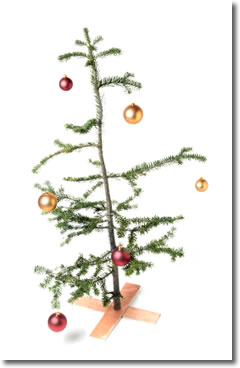Blue Christmas
Help for seasonal sadness
 In A Charlie Brown
Christmas, the title character is lamenting to his friend Linus that amid the
gifts and parties and glitter of the season, he feels empty and unhappy, like
he's not getting the real joy of Christmas. Linus replies that only he could
take the best holiday of the year and turn it into a problem! But the truth is
Charlie Brown is not alone. Many of us experience some "blues," sadness, or even
depression during the holidays. Often part of the solution is to transform our
idealized, unrealistic holiday expectations into personal meaningful holiday
expectations that really reflect our own deeply felt values.
In A Charlie Brown
Christmas, the title character is lamenting to his friend Linus that amid the
gifts and parties and glitter of the season, he feels empty and unhappy, like
he's not getting the real joy of Christmas. Linus replies that only he could
take the best holiday of the year and turn it into a problem! But the truth is
Charlie Brown is not alone. Many of us experience some "blues," sadness, or even
depression during the holidays. Often part of the solution is to transform our
idealized, unrealistic holiday expectations into personal meaningful holiday
expectations that really reflect our own deeply felt values.
Holidays can be demanding in many ways. They can be physically challenging, emotionally charged, family focused, and tradition bound. We may feel unprepared, or that we don't fit, or that we are the only ones not having a joyful time. I asked someone recently about their holiday difficulties and their biggest concern was sheer fatigue—from shopping, scheduling, and organizing "celebrations." Another client told me about seeing a card that pictured a warm cozy family nestled in front of a fireplace, and how it broke his heart because this was the first Christmas since his divorce, and he wouldn't be seeing his kids. Family expectations of togetherness, peace, and love can run right into the difficulties of real family life.
One element in resolving the holiday blues is finding "fresh start" events where hope and the possibilities for change are intentionally activated. A couple of steps are key.
•Identify your values—Ask yourself, "When the holidays are over, I hope…" There are lots of values—spending time with family and friends; reuniting with relatives; showing love or peace to others; sharing with the needy, lonely, or poor; creating space for relaxation or renewal; celebrating spiritual values or meanings, as in remembering the birth of Jesus.
•Discern your circumstances—Think of how the holidays really are for you. Do they reflect your values or someone else's? For example, most people rank gift-giving as low on their priorities, but spend most of their time/energy shopping.
•Act as if change is possible—Can you imagine doing something different? Think about the gift issue, and reflect on the meaning and reasons for gift giving. What do want to give to others: money, trinkets or yourself? Do you want to give to the affluent or the needy? Do you want to give merchandise or rather love, acceptance and reconciliation?
•Make your circumstances fit your values—Start small, but start! All holiday values are not equal. How do the traditions you trust guide your wisdom about who you are and where you should head? Many find meaning in the wisdom of:
Community—we are relational by nature.
Ritual/Remembering—we really are the stories we tell, the characters we invent, the places, event, and people we remember.
Transcendence—we are more than we seem, even to us, and are often restless to connect to a life larger than ourselves.Transformation—we are not yet who we will be; we can become what we hope.
I started with A Charlie Brown Christmas. There Charlie became the director of a Christmas play, and he was sent to get a Christmas tree. He came back with scraggly little tree that everybody made fun of. But he thought it just needed a little love to be beautiful, and it turns out he was right. I hope for the scraggly places in your holidays you'll find a little love, too.
Copyright © Ron Johnson